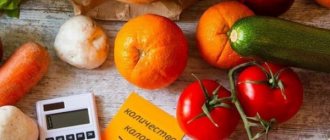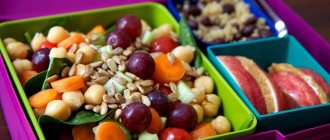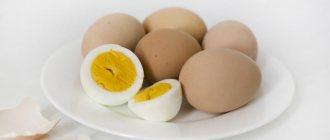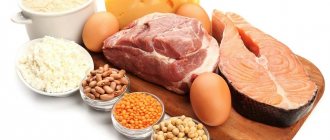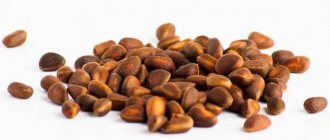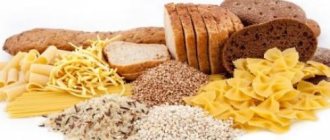Opinions are divided on how many hours before bedtime you can eat to avoid gaining excess weight. “Post-Soviet” nutritionists advocate a three-hour interval between dinner and bedtime. Women's magazines say that after six it is better not to try. Almost all bodybuilding and fitness sources insist that we have dinner with something like chicken breast with cucumber, or a pack of cottage cheese without any sweeteners. They say that this way fat will not be deposited, and we will lose excess weight faster. And Israeli scientists say that we can eat carbohydrates in our last meal and lose weight. How are things going in reality?
Should you eat before bed?
First, you need to figure out whether you can eat before bed. The fact is that digestion processes slow down during sleep and food eaten at night does not have time to be digested. For this reason, stomach diseases, dysbacteriosis develop and immunity deteriorates and, as a result, excess weight appears. But gaining an extra kilo is not the worst thing that can happen.
Disruption of the hormonal system leads to the appearance of such serious diseases as atherosclerosis, osteochondrosis, hypertension with subsequent strokes, etc. Depression, psychosis and other nervous disorders are a consequence of eating at night.
Experts note that while sleeping on an empty stomach, the body launches a rejuvenation mechanism, and if there is food in front of it, the level of sex hormone and stress hormone increases. This leads to accelerated aging of the body.
Ideal breakfast, lunch and dinner for weight loss. Menu for weight loss. Basics
First, let's remember the basic principles of nutrition during weight loss:
- hunger is prohibited!!!
- meals with an interval of no more than 4 hours;
- there are no prohibited products;
- the food is tasty and varied;
- stick to the optimal caloric intake (read how to calculate here).
Friends, when creating a menu for weight loss, remember that food, in addition to satisfying hunger, also gives pleasure. This is how it should be during weight loss. There is no need to eat tasteless food. It won't do any good.
If you now think that the easiest way is to boil buckwheat for the amount of daily calories, or buy low-fat cottage cheese and eat it until you lose weight. Stop! It is not right.
Don't rely on your willpower in hopes of holding out. Will not work! You'll fail sooner or later anyway. In order to lose weight, there is no need to “choke” on food that you don’t like. It is much easier to eat varied and tasty food.
Also, do not prohibit yourself from eating after a certain time. Eat when you are hungry. Just don’t confuse hunger and appetite - more details here. Focus on the physical manifestations of hunger - nausea, weakness, suction in the pit of the stomach, discomfort in the stomach. Believe me, it will do much more harm if you go to bed feeling hungry than if you have a snack before bed so that hunger does not bother you and prevent you from falling asleep.
My only wish is to try not to have dinner as your main meal. You yourself know when your body has the greatest need for food, focus on this, distributing the daily calorie intake in accordance with your needs.
And before we move directly to creating a menu for weight loss, I will remind you that fractional meals involve 3 main meals (breakfast, lunch, dinner) and 2-3 snacks (more is possible). We distribute the entire daily calorie intake over these 5-6 meals.
Light dinner
Gastroenterologists and pediatricians, discussing how many hours before bedtime you can eat, came to the conclusion that patients with diseases of the digestive system and children under 14 years old should not go to bed hungry. In this case, nutritionists suggest eating low-calorie foods. If we talk about light dishes for dinner, then these include boiled chicken with vegetables, baked fish with salad, cottage cheese.
Therefore, everyone else, except the above-mentioned categories of people, is not recommended to eat at night. But nutritionists also advise that if you really want to, you can eat light meals an hour before bedtime: a portion of green salad, stewed vegetables, a small portion of oatmeal with water, a glass of milk or kefir, a couple of apples, plain yogurt, a banana. They will be able to satisfy hunger well and will not harm the body.
To each his own
All people are different and there is no one-size-fits-all diet. Each theory has its supporters and opponents. Scientists also have not come to a consensus on how many times a day you should eat, since research data is often contradictory.
The Indians have an interesting approach to nutrition. Ayurveda says that there are people of the elements of fire, air, water and earth. Each type has its own digestion speed. Those who belong to the fire sign need to eat after 2 – 3 hours. People of the air element are recommended to take food after 3 - 4 hours, water - after 4 - 5 hours. The earth sign has the slowest digestion. This type of person needs to eat only 1–2 times a day, taking breaks between meals of at least 5–6 hours.
This is interesting! Ayurveda also focuses on a person’s age. Children need to eat often. Adults should eat according to their element. In old age, they eat 4 times a day, in small portions and without long breaks.
Let's draw conclusions! The frequency of meals is important for athletes and children. For the rest - according to needs and lifestyle. It has no effect on the health of an adult whether he eats once a day or six.
If a person eats two or three times a day, feels well, his weight is normal, and there is no hunger between meals, then this diet is suitable for him. In case of diseases of the digestive system, excess weight, or a tendency to overeat, you should try other systems.
How many times a day should you eat? Fractional nutrition or volumetric. Detailed analysis.
This food is not suitable for dinner
But if you still have doubts about whether you should eat at night, then you should always listen to your body.
There are people who allow themselves any errors in nutrition and do not gain excess weight. For those who are prone to obesity, you should eat no later than 3-4 hours before bedtime. During this period of time, the body will digest food and at the same time will not be hungry and will not store fat in reserve. But you should know what foods you should not eat for dinner. These are coffee and other drinks containing caffeine.
It also includes pizza, potatoes and especially French fries, fatty meats, sweet cereals and sweets, spicy, smoked and pickled foods. For dinner, you should eat light protein foods and avoid carbohydrates.
How many hours before bedtime can you eat? When answering the question, one must take into account the person’s lifestyle, the time of sleep and awakening, what food and in what quantity was consumed during the day. Everything here is calculated individually.
What's best to eat for dinner?
First of all, you need to start from the distribution of calories throughout the day. Dietitians call the following ratio of the daily diet:
- Breakfast 30-35%;
- Lunch 40-45%;
- Dinner 20-30%.
As can be seen from the above data, dinner should be the lightest meal of the day. But you shouldn’t go to extremes - a glass of water or lettuce leaves are unlikely to satisfy your evening hunger, and the emptiness in your stomach will prevent you from falling asleep. For proper rest, the last meal should be nourishing and balanced.
If you don’t want to waste time counting calories, the “plate rule” will help you plan your dinner correctly. According to him, the evening meal should include:
- Fresh or steamed vegetables.
They make up at least half of the entire portion. It is better to choose from non-starchy vegetables - tomatoes, cucumbers, zucchini, broccoli, cabbage. You can season them with a tablespoon of unrefined olive or flaxseed oil. Mayonnaise and fatty sauces are prohibited! This amount of plant products will create the illusion of a full stomach, and the coarse fiber and vitamins contained will benefit digestion. - Protein products.
For example, chicken, lean meat or fish. The protein should take up about a quarter of the plate—the size of your palm. Preference should be given to baked or steamed foods. Consumption of protein products is necessary for the restoration of the body - amino acids broken down during digestion serve as building materials for all cells. - Complex carbohydrates.
It is better to choose whole grains - buckwheat, brown rice, quinoa, spelt. They contain fiber and B vitamins, which are responsible for the balance of the nervous system and restful sleep. The serving of cooked carbohydrates should make up the remaining quarter of the plate.
Steamed vegetables for dinner are just the thing. It is
a mistake to think that drinking alcohol in the evening will help you relax and fall asleep faster. On the contrary, under the influence of ethyl alcohol a person sleeps superficially and lightly. The deep phase of sleep, responsible for recovery, is reduced, and as a result, there is a risk of getting up in the morning broken and tired. At dinner, it is better to prefer other relaxing drinks - herbal tea, compote or just water with lemon. But you should refrain from drinking coffee and black tea - the caffeine in them will invigorate you and prevent you from falling asleep peacefully.
People prone to gaining excess weight need to be especially careful about their dinner. For them, pickled, salted, fried foods are prohibited. You cannot eat fast carbohydrates, such as pastries, sweets, carbonated drinks - the sugar they contain will be deposited in the form of unwanted kilograms. If lunch was heavy, then the last meal can be lightened by cutting down on the carbohydrate component.
Nutritionist opinion
Previously, we reviewed foods that should not be consumed in the evening. Nutritionists offer recipes for dinners and late-night snacks. It is better to cook pollock, chum salmon, and salmon fillets 2-3 hours before bedtime. The fish must be baked in the oven. The ideal option would be fish cutlets or meatballs, baked in the oven or steamed.
You can cook mussels or shrimp for dinner. Poultry and lean beef should be cooked with vegetables. 1-2 hours before bedtime, it is useful to eat salads made from fresh herbs, which can be sprinkled with 1 tablespoon of flaxseed oil. It is sold at the pharmacy. Half an hour before bedtime, you are allowed to drink a glass of kefir or eat a little cottage cheese, washing it down with herbal tea.
Eating after 18 pm
Most nutritionists strongly advise against eating after 6 p.m. (especially for women), arguing that eating a late dinner increases the risk of gaining weight. And indeed it is. After all, human biorhythms and meal times are closely related.
For example, when the human body is most active, the digestive tract works at full capacity, processing food, incl. and heavy. Closer to sleep, the body prepares for rest, and the organs of the digestive system at such a time slow down.
If you load the body while resting, then food absorption does not occur properly. As a result, beneficial substances do not enter the blood, but are deposited in the fat layers in the hips and abdomen. However, it is possible to satisfy hunger at a later time with light dishes.
Fresh vegetables
You can eat fresh vegetables 2-3 hours before bedtime, as they have a positive effect on the body. The following vegetables are considered useful for a late dinner:
- Beet. This vegetable regulates the metabolism of fat cells, allowing a person to maintain a toned figure after a late dinner.
- Cabbage. Thanks to its beneficial properties, cabbage takes pride of place in dietary salad recipes, which means it is also suitable for evening consumption.
- Pumpkin. One of the most high-calorie foods, rich in carotene. In terms of positive effects, it resembles carrots, but has a less pleasant taste. Although this is not for everyone.
- Turnip. A very necessary vegetable to eat before bed and treat diabetes.
If you don’t like fresh vegetables before bed, you can cook caviar or salad. Such a light dish will diversify your diet and help you lose weight if required.
Benefits of fresh fruits
Fresh fruits are considered no less healthy and easier on the stomach than vegetables. Therefore, eating after 18:00 is allowed and recommended by doctors and nutritionists. Experts recommend the following fruits:
- Kiwi. This fruit is recommended to be taken even after the main dinner, since it is able to break down fat and relieve heaviness in the stomach. Adding kiwi to your regular diet can trigger weight loss.
- Nectarines and grapefruit. These fruits contain a large amount of vitamins that help improve the functioning of the digestive tract.
- Pears. Unlike apples, pears do not increase appetite, so consuming them before bed is a smart decision.
Important! It is strictly forbidden to consume watermelon at night, as it has a diuretic effect. However, nutritionists advise adding it to your daily diet, as watermelon cleanses the kidneys and liver.
Despite the great benefits of fruits, they should be consumed in moderation so as not to provoke allergies.
Fermented milk products as an alternative to a light dinner
If a person is hungry, and in the refrigerator there are only those foods that cannot be eaten before bed, then it is recommended to satisfy your hunger with low-fat fermented milk products, namely:
- fermented baked milk;
- kefir;
- yogurt.
But the above dairy products should be consumed exclusively without sugar, as it neutralizes the beneficial properties.
Porridge
Among the porridges that can be consumed at a late hour, without harm to the stomach, only unsweetened oatmeal cooked in water can be distinguished. As for cereal porridges, buckwheat, pearl barley, semolina and others, it is better to eat them at lunch, since in order to process the elements, the stomach must work at full strength.
Making dinner healthier
If you have already developed the habit of eating just before going to bed, and in the morning you have to wake up with a feeling of heaviness, fatigue, and bags under the eyes and swelling appear, then you need to gradually moderate your evening appetite. To do this, you need to change your dinner diet - remove high-calorie foods and replace them with lower-calorie foods.
It is important to avoid consuming alcoholic beverages at night; it is preferable to drink water or green tea. It is recommended to use aromatherapy: the smells of fir, vanilla and mint help relieve hunger and promote restful sleep.
Salad for drying the body is an ideal dinner. Body drying nutrition program for girls
Drying the body allows you to quickly achieve the desired effect. However, when drawing up a nutrition program, girls should not forget about preserving women's health.
A body drying diet for girls should include in the daily menu the consumption of foods with an optimal ratio of proteins and carbohydrates.
When drying your body, you need to consume the following products:
- rich in protein;
- containing carbohydrates that promote the breakdown of fat cells;
- Low-calorie foods that simultaneously support the body's metabolic process at a normal level.
How much protein per 1 kg of body for girls
Protein serves as the raw material for the generation of new body cells. During the period of drying the body, the daily protein requirement per 1 kg of weight for a girl is 1.5-2.5 g. In turn, 2/3 of the resulting proteins should be of animal origin, which are quickly absorbed and more fully used by the body.
Protein products of animal origin (complete proteins) are well absorbed by the body and make it possible to maintain muscle mass during the period of drying the body.
Such increased protein consumption during a period of decreased energy value of food helps maintain muscle size and also, if necessary, serves as an alternative energy resource.
How many calories can you have per day?
To dry out the subcutaneous fat layer, it is necessary to create a calorie deficit. In order for body drying to proceed without harm to health, it is necessary to create a calorie deficit for the body that will allow it to adapt to changes in physical activity and nutrition, as well as maintain muscle volume.
The critical level of calorie intake for girls who regularly engage in sports is in the range of 1450-1700 kcal.
The recommended calorie reduction scheme is gradual and involves reducing the energy value of food consumed by 7-10% every 7 days until a critical level is reached.
On a diet when drying the body for girls, a sharp reduction in the calorie content of consumed foods to a critical level is unacceptable on the menu, since instead of the desired result, this will lead to loss of water in the body and a decrease in muscle mass.
How many carbohydrates do you need per day
Despite the fact that carbohydrates are the main generator of energy, the diet during the period of drying the body should include a decrease in the rate of their consumption.
The daily requirement for carbohydrates per 1 kg of a girl’s weight should be within the following limits:
- on the I and II seven-day diets - 3-4 g;
- on the third and fourth seven days - 1.5 -2 g;
- from week V - 0.5-1 g.
The need for daily carbohydrates, gradually decreasing, will reach 40-60 g for girls.
Night carbs
Numerous tests have given a clear picture: nighttime sleep deteriorates, does not allow the body to recover after a hard day, and the nervous system becomes tired and gradually weakens.
However, according to tests by The Hebrew University of Jerusalem on 78 participants, there was a result: after six months of eating carbohydrates mainly for dinner, the experiment participants:
- fat mass decreased;
- leptin and insulin levels normalized;
- shortness of breath decreased after strength exercise.
Another study was conducted that showed that eating carbohydrates before bed is healthier than after it, since during sleep the body slows down all life-supporting processes and the stomach is unable to fully digest too high-calorie foods at night.
Interestingly, after the experiment, people’s blood glucose levels stabilized, which made it easier to endure night hunger and not rush to the refrigerator.
What is metabolism and how does metabolism work?
Metabolism is all metabolic processes in the body associated with the expenditure of energy. Some people have a very fast metabolism. They instantly waste all the energy that enters the body. Such people are naturally thin. It is extremely difficult for them to gain weight. If the metabolism is slow, then it takes much longer to expend energy.
You can accelerate metabolic processes with simple but systematic actions:
- Reducing food portions;
- Reducing the interval between meals;
- Physical activity.
If we imagine human metabolism as a huge furnace, then food is the coals that we periodically throw into the firebox. In order for the flame to burn properly, it is necessary to constantly add fuel and fan the heat. If you don't add coals, the flame will die out. If you add too much fuel at once, the fire will also not be able to burn.
When you clearly understand what processes are taking place inside, it is easier to draw up a further algorithm of actions for losing weight.
Be sure to read: A varied and healthy menu for 900 calories a day
Common Mistakes
People who are losing weight make many common mistakes when creating their daily diet:
- Refusal to eat after 15-16 hours of the day. Long breaks between meals slow down metabolic processes. In the morning you experience a strong feeling of hunger, there is a risk of eating more than the established norm.
- Fruit for dinner. You can often hear among those losing weight that they do not have dinner, but only eat an apple or orange before bed. Fruits contain a high amount of acid; its excess provokes diseases of the gastrointestinal tract. A large amount of fructose and glucose entering the body provokes the release of insulin into the blood. This is fraught with the development of type 2 diabetes.
- Porridge before bed. It is not advisable to eat carbohydrates in the evening. The exception is easily digestible foods rich in fiber. A vegetable salad before bed is not prohibited, especially if you eat it with a piece of chicken breast, hard low-fat cheese or cottage cheese.
Be sure to read: Losing weight with kefir fasting day
- Eating fatty meats in the evening. Everyone knows that meat products are rich in protein, but fatty pork or old beef are not the best choices for dinner. Such foods are difficult to digest. The body is forced to work at a time when it should be resting. You may have trouble sleeping. It is better to give preference to chicken or turkey.
- Sweet yoghurts, curd desserts. Cottage cheese in its pure form is recommended as a dinner, but it is better to avoid sweet yoghurts and fermented milk desserts altogether. There is no benefit to them, and excess sugar will certainly end up as fat reserves.
Knowing common mistakes will make it easier for you to avoid them. Consult a personal trainer regarding the formation of your daily diet. Make a list of allowed dishes and products. It is much easier to maintain a diet if you create a menu for the week. Every day the question of what to cook does not arise. You know for sure that you maintain a balance of carbohydrates, fats and proteins and do not consume extra calories.
When you notice the first results, you will understand that the chosen approach is appropriate. This becomes the best motivation for further weight loss.
The role of nutrition in the process of losing weight
It is from food that we get energy for everyday existence and nutrients for health. Food is our fuel. Nature has endowed humans with developed taste buds. Unlike most animals, we are able to enjoy food. For many this becomes a real problem.
Our entire diet consists of carbohydrates, proteins and fats. A common mistake some people make when trying to lose weight is that they completely eliminate fat from their diet in an attempt to lose weight. Such people are sure that it is the fat that comes from outside that is deposited on the sides. This is partly true. Saturated fats of animal origin have this ability, but their volume entering the body is negligible. All lipids in the body affect metabolic processes, and their deficiency leads to problems with the skin and blood vessels.
Be sure to read: Dry fasting according to Shchennikov - a description of the method, its advantages and disadvantages
Carbohydrates are converted into strategic reserves on the hips and abdomen. They give the body energy, but if there is too much of it, the excess is stored for the future. Proteins perform a “construction function” in the body. They are responsible for building muscle mass.
It is the abuse of carbohydrates that leads to weight gain. If you also lead an inactive lifestyle, then your body volume is constantly growing, and cellulite appears on your hips, buttocks, and abdomen.
As soon as food intake decreases, weight gain stops, but this is not enough for weight loss. In order for the body to begin to spend strategic reserves, it is necessary that the energy consumed be less than what a person needs. By creating a calorie deficit, we achieve weight loss. But here, too, not everything is as simple as we would like.
When a person begins to go hungry, severely restrict himself in nutrition, and take significant gaps between meals, the body perceives this as a signal of distress. The brain gives a signal to all organs and systems to reduce calorie consumption as much as possible. Metabolic processes slow down, weight comes off extremely slowly or does not go away at all.
It is extremely difficult to stay on a strict diet for a long time. When a person returns to his usual diet, the body, remembering the stress it has experienced, begins to accumulate even more reserves, preparing for the next “hunger period.” That is why, after completing strict diets, most people who lose weight quickly regain the lost kilograms, even with excess.
What does this have to do with evening meals, you ask? If you refuse dinner and follow the fashionable rule “not to eat after six,” you will only slow down your metabolism. This approach prevents effective weight loss.
Reasons for Late Snacking
We have already figured out how harmful the “night watch” is; now it is important to understand the causes of such attacks in order to eradicate this bad habit once and for all.
- Habits associated with external stimuli and circumstances.
- Lack of a full dinner.
- Lack of food and specific elements (vitamins, minerals) per day.
- Moral prohibitions or troubling problems.
Of course, there may be several reasons or even all of them together, so you need to analyze your behavior, feelings and determine what is the impetus for eating late. Don't be discouraged if you think that all 4 reasons describe your case, it just means that you need to try all the solutions given below.
Let's look at each reason in a little more detail using specific examples.
- Every evening you want to watch TV/film/series and “chew” something while watching it. Or you’re used to drinking tea and cookies with your family/friends before bed. Or you come home from work late and tired, you just want to quickly eat something and go to bed. Or simply, you are used to falling asleep only with a full stomach.
- We didn’t have time to eat before a certain time (invented by you) and decided to skip dinner altogether. Or they ate 1 cucumber and 50 grams of fish (which is portioned and does not reach 200 grams). Or they decided to eat a bar or cake for the allowed amount of calories (and this is a fast carbohydrate that sharply increases blood sugar and quickly “evaporates”).
- All day at work, my head is occupied with other things, as a result of the day a couple of apples and a sandwich (at best). Or you eat the same type of food for a week (an unbalanced diet and, as a result, a lack of vitamins). Or you decided to go on a diet where you need to eat too little per day.
- You strictly limit yourself to something, forbid yourself a certain product (the forbidden fruit is sweet). Or in the evening all the problems of life come up and to calm down, you eat just one chocolate bar.
And now we are all sobbing from hopelessness and exhaling deeply. This is not a tragedy at all and there are no ideal people in the world. Any problem can be overcome if you take it seriously. That's what we'll do now.


